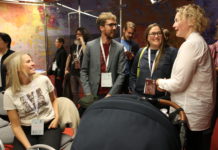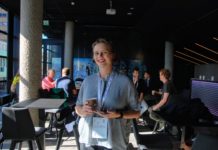On Sunday, May 21st, 2017, Guga S’thebe Cultural Hub in Langa Township played host to a Focus Day on Theatre for Healing. The contributors brought in different and diverse perspectives – the day’s activities ranged from speakers discussing the use of the Arts for Youth Wellbeing, to facilitators conducting workshops on how safe spaces may be created through the Arts.
The following quotes represent snippets from various seminars and workshops throughout the day:
 “How can these children reclaim some manner of autonomy when, for their very survival, their [disease] demands that their autonomy be removed?” – Christopher Weise on his digital storytelling program, based in Arizona (USA), created specifically for children suffering from cancer.
“How can these children reclaim some manner of autonomy when, for their very survival, their [disease] demands that their autonomy be removed?” – Christopher Weise on his digital storytelling program, based in Arizona (USA), created specifically for children suffering from cancer.
“As much as this project is beneficial for me as a Theatre artist, is it really beneficial for them? Is it really helping them to survive in this harsh condition where actually Theatre making is not a crucial skill to surviving?” – Ji Sun Myung responding to an audience question about ineffective or problematic work.
 “We brought in two experts in Theatre and Civic Practice to specifically develop knowledge around recognising power structures and the implementation of tactics that leverage their youth and art. […] We explored ways to leverage status in the Arts to change the flow of power structures.” – Erik Villiers on his work in Arizona (USA) which uses Theatre to engage Youth in democracy and civic participation.
“We brought in two experts in Theatre and Civic Practice to specifically develop knowledge around recognising power structures and the implementation of tactics that leverage their youth and art. […] We explored ways to leverage status in the Arts to change the flow of power structures.” – Erik Villiers on his work in Arizona (USA) which uses Theatre to engage Youth in democracy and civic participation.
“After the [drama]therapy sessions, we found out that they were more relaxed to talk about other things that would move their future forward. […] By letting them live drama by themselves, it helped them a lot.” – Pamela Udoka on her work in Nigeria with women and children suffering from mental health issues following their contact with Boko Haram.
 “For me, what I’m interested in is creating realities in a space that we have control over. Because outside, we don’t have control.” – Timira Gupta on her work using Art, Music and Dance to heal.
“For me, what I’m interested in is creating realities in a space that we have control over. Because outside, we don’t have control.” – Timira Gupta on her work using Art, Music and Dance to heal.
“However, as we spent time together, I was learning the reality of their daily lives. I learned that one of our members had to take care of her 8 younger siblings. […] Another lives so far from the church that she cannot afford public transportation so she always walked to the church. I didn’t know that being punctual is also a privilege.” – Ji Sun Myung on her Theatre work with Youth in the Philippines.
 “A lot of times I’m wondering if I’m exercising too much of my creative power, my creative thought and decision-making of what can I do with it. How can I honour what [the Youth] want more than anything?”- Christopher Weise on designing Arts for Healing programmes.
“A lot of times I’m wondering if I’m exercising too much of my creative power, my creative thought and decision-making of what can I do with it. How can I honour what [the Youth] want more than anything?”- Christopher Weise on designing Arts for Healing programmes.
“My presentation was aimed at looking into how we create a safe space in learning environments […] I had specified that the workshop was going to be for teachers and facilitators but surprisingly some young people joined in and changed the way I wanted to do my presentation. It was worth it because it made me experience the way they would react around older people and see if they would experience the safe space in the whole process.” – Thembile Tshuma reflecting on his workshop session, ‘The Invisible Prison’.









